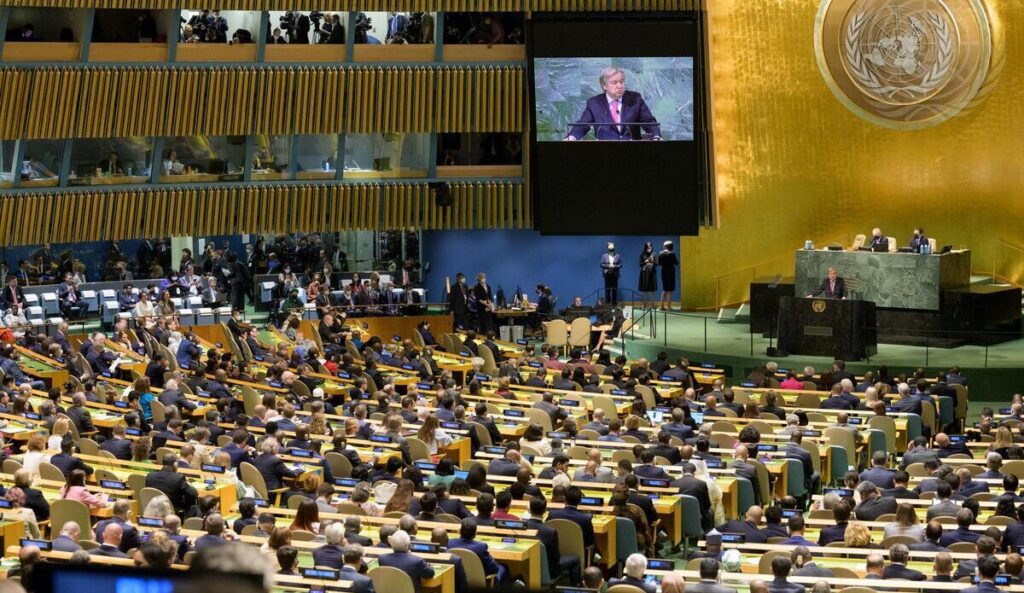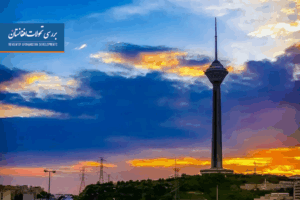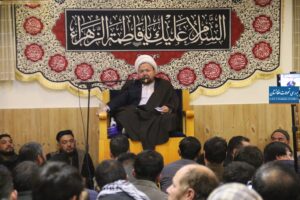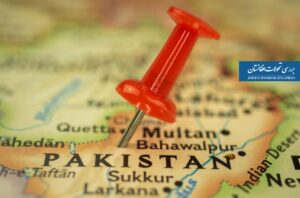Review of Afghanistan developments
On July 6, 2025, the United Nations General Assembly convened to discuss Afghanistan, resulting in the adoption of the organization’s proposed resolution with 116 votes in favor, 2 votes against, and 12 abstentions. The resolution faced opposition from the United States and Israel.
Highlighting the critical humanitarian crisis in Afghanistan, the ongoing provision of humanitarian assistance, the Taliban government’s role in enabling the delivery of such aid, the appointment of a Special Coordinator by the UN Secretary-General for Afghanistan, the necessity of establishing an inclusive government, expressing apprehension regarding the infringement of the basic rights of women and girls, urging nations to maintain responsible interactions with the Taliban government to ensure security and counter terrorism, and underscoring the Taliban’s obligation to uphold international human rights commitments are key themes of the recent UN resolution concerning the situation in Afghanistan.
The United Nations approach and solution
The United Nations, adopting a pragmatic perspective, has designated the Taliban government in this resolution as the governing authority or the factual situation in Afghanistan. In this context, the United Nations implicitly acknowledges the Taliban government as the sole governing entity in Afghanistan’s internal matters. Furthermore, this resolution has subtly indicated the Taliban government’s effective role in addressing insecurity, fighting terrorism, and collaborating with humanitarian and relief organizations and initiatives in Afghanistan.
While the UN resolution has introduced numerous responsibilities and priorities for tackling the Afghan crisis, the establishment of an inclusive government that includes representatives of women, various ethnic groups, and religions in Afghanistan constitutes the primary demand and core essence of the UN General Assembly resolution.
Member states of the United Nations, guided by their national interests and principles of foreign policy, have taken various approaches to address the Taliban government in pursuit of this objective. However, the United Nations views responsible engagement with the Taliban government as the sole effective means to reform and enhance the situation in Afghanistan, as well as to integrate Afghanistan into the global system.
The United Nations has endeavored to promote this strategy and its framework through a succession of international gatherings over the last two years, which have been referred to in media discussions as the Doha Process. However, it appears that the United Nations has not achieved success in this initiative. The shortcomings of this international body can be attributed to several factors that represent the primary challenges confronting the role of the United Nations in Afghanistan.
The main challenges facing the United Nations
1. The United Nations: Mediating Institution or Game Tool
The historical account of the UN’s activities in Afghanistan illustrates the inadequacy of its efforts to address the significant crises within the nation. Throughout the Cold War and the period of Soviet occupation in Afghanistan, the UN was swayed by the strategies of competing powers in the region. In the two decades of US presence in Afghanistan and its hasty exit, the UN either embraced a stance of marginalization or was compelled into seclusion by the actions of the US.
Following the Taliban’s resurgence in Afghanistan and the establishment of the Moscow format as the sole avenue for regional agreement in addressing the nation’s crisis, the United States was resolute in its intention to manage the Afghan situation via the UN channel. Consequently, the Doha Process was initiated concurrently with the Moscow format. However, what were the reasons behind the failure of the Doha Process?
The absence of backing from neighboring nations and the Taliban administration for the Doha process, attributed to US and Western policies, is regarded as the primary cause of this process’s failure. Since the inception of the Doha process, both regional countries and the Taliban government have approached the intentions of its founders with skepticism and have withheld their support. Drawing from past experiences, it is evident that without the endorsement of regional countries, international initiatives for Afghanistan are unlikely to succeed.
Concerning the Doha process, the Taliban administration held the view that the United States and its European allies were leveraging the legitimacy of the United Nations as a means to impose their political framework for governance and the establishment of a new government in Afghanistan. This perspective was the basis for the opposition from regional nations and the Taliban administration against the appointment of a UN special representative, even in light of the presence of the United Nations Assistance Mission in Afghanistan (UNAMA).
2. The bipolar atmosphere in global politics
One of the primary challenges confronting the role and mission of the United Nations in Afghanistan, as clearly demonstrated in this recent meeting, is the prevailing bipolarity between Western and Eastern powers regarding the Taliban government. The United States and the European Union, driven by their interests, advocate for a limited, conditional, and pressure-oriented engagement with the Taliban government, whereas Russia and China, in conjunction with regional nations, have embraced a pragmatic approach centered on engagement. This bipolarity has hindered the establishment of an international consensus concerning Afghanistan.
The recent session of the UN General Assembly illustrates this divergence, which was similarly evident in the abstentions or negative votes from certain nations. This bipolar environment has overshadowed not only the situation in Afghanistan but also the broader region. It is evident that the conflicting interests of various countries cannot be harmonized under the present circumstances, and the negative vote cast by the US on the resolution indicates that it is improbable for the country to relinquish its competitive stance.
In a context where a bipolar situation looms over Afghanistan, the only remaining path for the Taliban government is to consciously assess the existing bipolar conditions based on national interests and choose the correct direction. This is crucial because Afghanistan, in its current state, cannot establish uniform and risk-free relations with all opposing and conflicting factions as it did during the reign of King Zahir Shah.
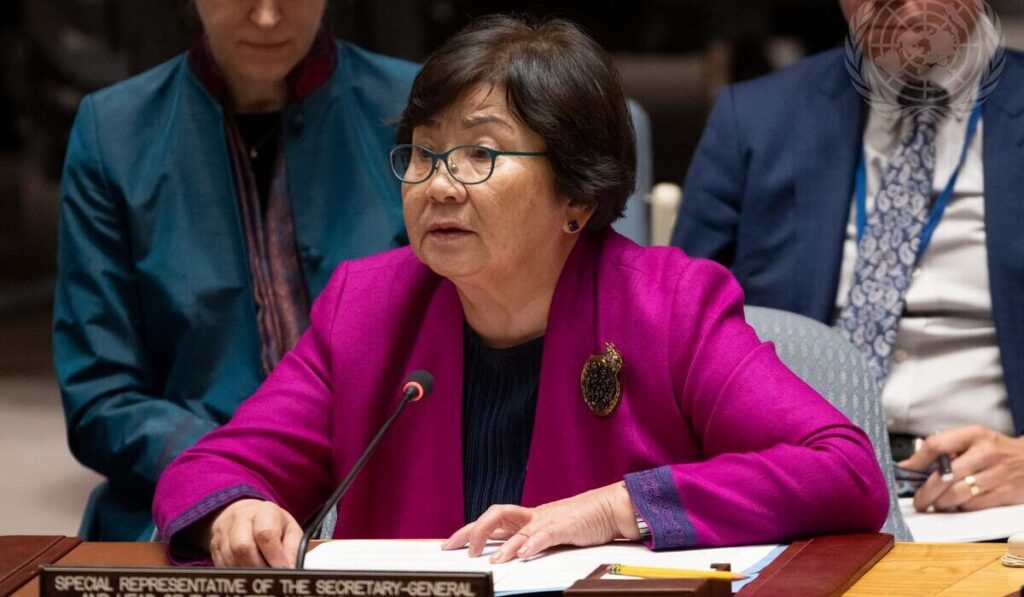
3. The Taliban and the Crisis of Inclusive Governance
A fundamental principle of the resolution is the focus on establishing an inclusive government that involves all ethnic groups, religious communities, and political factions in Afghanistan. Nevertheless, the Taliban administration has, up to this point, refrained from allowing any political engagement from ethnic groups, adherents of various religions, and women.
The ongoing political crisis in Afghanistan, characterized by the lack of an inclusive political framework and the absence of representatives from various ethnic groups and religious communities within the decision-making hierarchy, has resulted in a political impasse. The exclusion of representatives from Afghanistan’s multifaceted society from the governmental structure undermines the Taliban government’s ability to garner support from the entire nation. This scenario fosters a latent divide between the government and the populace, which can be easily exploited by external entities. Furthermore, the monopolistic nature of the government, dominated by a single individual, poses challenges to its international standing, thereby questioning the legitimacy of this regime within the global order. The current predicament of the Taliban government has emerged as a vulnerability in international relations and serves as a means for exploitation by various actors.
Given the present situation, the Taliban government stands as the only governing authority and the exclusive decision-maker in the formation of an inclusive government in Afghanistan. It does not face the same challenges that the Mujahideen government encountered in the 1970s when attempting to establish an inclusive government.
In the absence of the Taliban’s genuine commitment to establish an inclusive government, the United Nations is devoid of the necessary executive mechanisms to alter the circumstances in Afghanistan. Should the Taliban administration proactively seek to create an inclusive government, the rationale and basis for intervention by international entities in Afghanistan would be eliminated. Consequently, both nations and the United Nations would be unable to deny recognition of the Taliban government.
Conclusion
While the recent meeting of the UN General Assembly and the passage of a new resolution represented a significant advancement in preserving the relative cohesion of the international community concerning the situation in Afghanistan, they also highlighted the inadequacy of the existing framework of international politics in effectively addressing the Afghan crisis.
Related Articles
Implications of the ICC’s measures against the Taliban leader
To address the existing stalemate, the United Nations should initially seek to prevent its instrumentalization by Western countries. Secondly, it should involve regional institutions and frameworks, including the Organization of Islamic Cooperation, the Shanghai Cooperation Organization, and the Moscow format. Lastly, it must foster consensus and a thorough dialogue among the diverse and fragmented opposition to the Taliban regime, while also motivating adversaries of the Taliban government to participate in intra-Afghan discussions.
countries that are allied with the Taliban regime, including Russia and China, ought to endeavor to persuade the Taliban administration to establish an inclusive government and uphold human rights in Afghanistan.
By understanding these aspects, the United Nations can transform its position from a passive participant to an active mediator.


